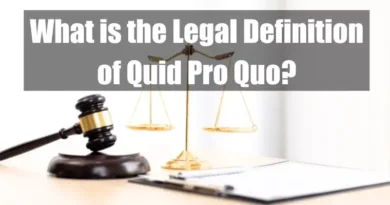Suggesting a Quid Pro Quo
Takeaways
| Key Points |
|---|
| Quid pro quo, a Latin phrase meaning “something for something,” originated in the Middle Ages and describes exchanges where each party expects something in return, commonly seen in business, law, and politics. |
| In business, it refers to agreements where both sides provide valuable considerations, such as products, services, or financial assets, ensuring a legally binding contract unless deemed unfair or one-sided. |
| While some quid pro quo deals, like barter arrangements, are ethical, others, such as soft dollar agreements in finance, raise ethical concerns due to hidden costs and conflicts of interest, prompting regulatory oversight. |
| In politics, quid pro quo often involves campaign donations influencing policy decisions, which, while not always bribery, has led to Supreme Court cases debating its legality and fairness. |
| Although quid pro quo is legal in many situations, it becomes unlawful when linked to bribery, blackmail, or coercion, with cases like workplace sexual harassment being clear violations of the law. |
What Is Quid Pro Quo?
Quid pro quo is a Latin phrase that means “something for something.” It started in Europe during the Middle Ages and describes a situation where two people or groups agree to trade goods or services with each other. In this type of deal, one person will give something only if they get something in return.
In business and law, quid pro quo means something of mutually agreed upon value has been traded. In politics, it can sometimes describe a situation where someone says, “I’ll do this for you if you do that for me.” This is allowed as long as it doesn’t involve bribery or illegal actions.
Business Quid Pro Quo

The main idea of a quid pro quo business agreement is that both sides provide something of value, like a product, service, money, or financial asset. These items are called “considerations” and are part of the contract, meaning both sides agree to exchange something of equal value. Without these considerations, a court might declare the contract invalid.
If the agreement seems unfair or heavily one-sided, a court might also decide the contract is not valid. This is why it’s important for anyone making a deal—whether it’s a person, business, or organization—to know what each side is expected to give or receive before signing a contract.
An example of a quid pro quo in business is a bartering deal, where two people trade goods or services of similar value. In other situations, quid pro quo could refer to less balanced exchanges, such as when people trade favors, which can sometimes be seen as ethically questionable.
The term “quid pro quo” comes from Latin, meaning “something for something.” It first appeared in the 16th century to describe swapping one medicine for another.
Perception about Quid Pro Quo
Quid pro quo agreements can sometimes be seen in a negative light. For example, in a deal between an investment bank’s research department and a public company, the bank might change its rating of the company’s shares in exchange for the company’s business, such as underwriting its stock offerings.
Because of these possible conflicts of interest, U.S. financial regulators have stepped in and created rules to make sure that companies prioritize their customers’ interests when they issue stock ratings.
Another example of a questionable quid pro quo is a soft dollar agreement. In this type of deal, one firm (Firm ABC) uses research provided by another firm (Firm XYZ). Instead of paying with regular money, Firm ABC lets Firm XYZ handle all of its trades.
This exchange of services acts as payment, but studies have shown that trades done under soft dollar agreements often cost more than just paying for the trades directly. While these agreements are legal in the U.S. and other countries, they are discouraged in some places and considered unethical by some people.
In the U.S., the Federal Election Campaign Act also limits how much money donors can give to political campaigns to prevent unfair quid pro quo arrangements.
Political Quid Pro Quo
Quid pro quo deals also happen in politics. For example, a politician might receive donations and, in return, feel the need to offer something back later, such as influencing policy or making certain decisions.
This type of quid pro quo doesn’t always mean bribery. It can simply mean that the politician agrees to consider the donor’s interests when creating laws or voting on issues.
There is a lot of debate about quid pro quo in politics. In the past 40 years, many cases have gone to the Supreme Court to decide what makes such agreements illegal.
Quid Pro Quo Definition and Meaning
“Quid pro quo” is a Latin phrase that means “something for something.” Today, it means doing something with the expectation of getting a favor in return, like “I help you, you help me.” The phrase was first used by pharmacists in the 1500s when they gave a substitute remedy if they didn’t have the original one.
Quid Pro Quo Legality
Quid pro quo is only illegal if it breaks the law, like in cases of bribery, blackmail, or asking for something unrelated to work in exchange for not firing someone. Even if it’s legal, people might still think it’s wrong.
An Example of Quid Pro Quo
There are many examples, like trading goods or giving gifts. An illegal example would be sexual harassment, where work benefits are offered in exchange for sexual favors.
Other Ways to Say Quid Pro Quo
Other phrases that mean the same thing include “I help you, you help me,” “this for that,” or “tit for tat.
Final Verdict
Quid pro quo means doing something in return for something of equal value. It is not usually about money but involves trading one service for another. Typically, one person does a favor with the expectation that the other person will return a favor or service later. This concept is common in business and politics.
FAQ
Why does quid pro quo employment practice suggest quid pro quo?
The term “quid pro quo employment practice” implies that employment benefits, such as promotions or favorable assignments, are exchanged for specific actions or compliance from an employee. This arrangement enforces a clear, reciprocal obligation, ensuring that each party’s gain is directly contingent on the other’s performance.
Why does a conditional benefit arrangement suggest quid pro quo?
A conditional benefit arrangement indicates that benefits are granted only after certain predetermined conditions are satisfied, establishing an inherent exchange mechanism. This structure reflects the quid pro quo principle by linking every advantage to a specific required action, ensuring fairness and accountability.
Why does the reciprocal exchange mechanism suggest quid pro quo?
The reciprocal exchange mechanism underscores a systematic process where each party’s contribution is met with a corresponding benefit, embodying the essence of quid pro quo. It reinforces a balanced transaction by ensuring that obligations and rewards are mutually dependent and precisely matched.
Why does a mutual concession contract suggest quid pro quo?
A mutual concession contract involves both parties making deliberate compromises or offering benefits in exchange for receiving something of equivalent value. This contractual framework inherently embodies quid pro quo by mandating that each concession is reciprocated, thereby maintaining a fair and balanced agreement.
Why does the transactional inducement structure suggest quid pro quo?
The transactional inducement structure is built on offering specific inducements that are directly tied to achieving agreed-upon outcomes, reflecting the quid pro quo philosophy. This method ensures that rewards are only provided once reciprocal obligations have been fulfilled, reinforcing the direct exchange of benefits.
Why does exchange-based inducement suggest quid pro quo?
Exchange-based inducement focuses on providing incentives that are explicitly contingent on receiving a reciprocal action or benefit from the other party. This approach clearly mirrors the quid pro quo concept by ensuring that every inducement is part of a balanced, mutually beneficial exchange.
Why does the reciprocal obligation framework suggest quid pro quo?
A reciprocal obligation framework delineates the responsibilities and benefits each party expects to deliver, thereby structuring a balanced exchange. It reflects the quid pro quo principle by ensuring that every commitment is met with an equivalent performance, maintaining equilibrium in the agreement.
Why does the benefit-for-service model suggest quid pro quo?
The benefit-for-service model emphasizes that specific benefits are provided in return for services rendered rather than through traditional monetary compensation alone. This model inherently supports the quid pro quo concept by linking each service to a direct, tangible benefit, ensuring that both sides are fairly rewarded.
Why does a value-for-value transaction suggest quid pro quo?
A value-for-value transaction is characterized by each party receiving benefits that are directly proportional to the value they provide, a hallmark of the quid pro quo approach. This ensures a balanced exchange where the benefits are equitably matched, promoting transparency and fairness in the deal.
Why does a bilateral benefit agreement suggest quid pro quo?
A bilateral benefit agreement requires both parties to commit to offering benefits to one another in a reciprocal manner, thereby reinforcing the quid pro quo doctrine. By clearly outlining each party’s obligations and expected returns, this agreement ensures that the exchange remains fair and mutually advantageous.
Why does reciprocity clause dynamics suggest quid pro quo?
Reciprocity clause dynamics involve specific contractual provisions that require a mutual exchange of benefits under clearly defined terms, directly reflecting the quid pro quo principle. These clauses enforce a legal balance by ensuring that all promises are contingent upon reciprocal actions, thereby safeguarding each party’s interests.
Why does the exchange incentive strategy suggest quid pro quo?
An exchange incentive strategy is designed to motivate reciprocal behavior by linking the provision of an incentive directly to the receipt of a corresponding benefit. This strategic approach mirrors the quid pro quo model by ensuring that incentives are part of a balanced exchange, where both parties actively contribute to the agreement.
Why does conditional reciprocity agreement suggest quid pro quo?
A conditional reciprocity agreement sets forth specific criteria to be met before reciprocal benefits are exchanged, aligning closely with the quid pro quo framework. This agreement ensures that both parties remain equally accountable for their respective obligations by tying the exchange of benefits to pre-established conditions.
Why does the mutual benefit exchange term suggest quid pro quo?
The mutual benefit exchange term highlights the principle that all benefits within a transaction should be reciprocated equally, reflecting the core of quid pro quo. It reinforces a balanced exchange by ensuring that every advantage one party provides is matched by an equivalent benefit from the other.
Why does quid pro quo compliance standard suggest quid pro quo?
The quid pro quo compliance standard establishes clear guidelines that mandate reciprocal actions, ensuring that benefits are only exchanged when all parties meet their predefined obligations. This standard epitomizes the quid pro quo principle by formalizing a balanced framework where compliance is contingent upon mutual performance.









